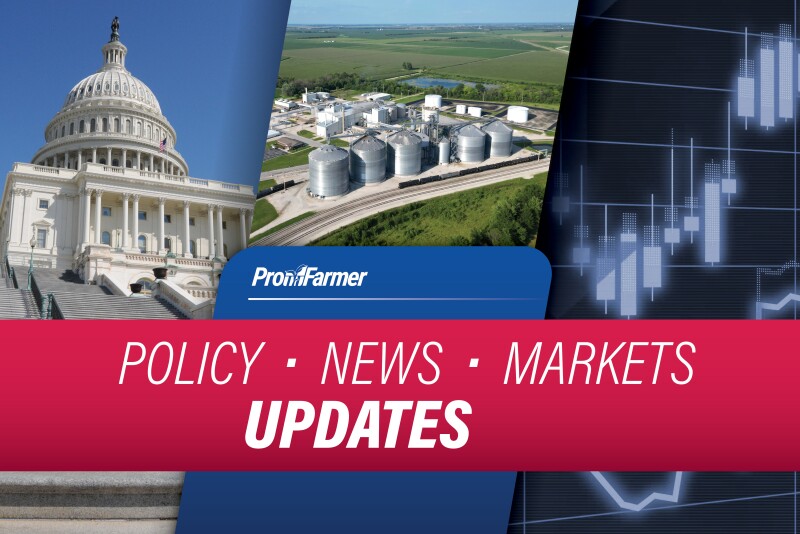Corn Grower Leaders Raise Alarm Over High Input Costs: The National Corn Growers Association (NCGA), along with 25 state-based corn grower groups, sent a letter to Trump administration officials on Aug. 1 detailing the worsening economic situation caused by elevated prices for fertilizers and other inputs that are critical for growing corn.
The letter, sent to the U.S. trade representative, secretary of commerce and secretary of agriculture, painted a grim economic picture in the American countryside. Signatories pledged to work with the officials to help address concerns with input costs, implement new trade deals and remove trade barriers.
“Unfortunately, the combination of the low corn prices, trade uncertainty, and consistently high costs for fertilizers and inputs, including relevant countervailing duties, have resulted in a calamitous environment for farmers who are trying to plan for harvest and next season,” the letter said.
Lindberg Confirmed as USDA’s Top Trade Official: The Senate confirmed Luke Lindberg on Saturday night to be the Agriculture Department’s undersecretary for trade and foreign agricultural affairs.
Lindberg, who served as chief of staff of the Export-Import Bank during the first Trump administration, has been a senior fellow with the Trump-aligned America Fist Policy Institute co-founded by Agriculture Secretary Brooke Rollins and is president and CEO of South Dakota Trade, which assists businesses in that state with trade issues.
Senate Majority Leader John Thune, R-S.D., is Lindberg’s father-in-law.
Lindberg’s nomination wasn’t controversial but the confirmation process has slowed to a crawl this year as Democrats exercise some of their limited political leverage.
Lindberg told the committee at his confirmation hearing in April that his top priority would be eliminating the U.S. agricultural trade deficit, now projected to be $49.5 billion for fiscal 2025.
Lindberg said that, if confirmed, he would immediately invite “all of the different commodity groups from around the country to come in and have conversations with us.”
How Tariffs Raise Costs for Farmers, Making Food More Expensive: American farmers, ranchers and agricultural industry experts are still sorting through what increased tariffs on dozens of countries will mean for both U.S. farm products and consumers.
But there are a few broad areas where American farmers, and consumers, are likely to see prices rise or products disappear, The New York Times reported on Friday.
New-Crop US Soybean Export Sales at 20-Year Low: As of July 24, US soybean exporters had sold just over 3 million metric tons of soybeans for export in 2025/26, which begins September 1. That volume is a 20-year low for the date and is down 12% from last year.
New-crop sales are struggling because China has yet to buy a single cargo, and this is China’s latest start in the U.S. bean market since 2005. However, in 2005, the first Chinese purchase came during the week ending August 11. If China sits out beyond that timeframe this year, it will be the latest they have waited to start buying since at least 1999, the extent of USDA’s online database. This would thrust the U.S.-China soybean trade flow into uncharted waters.
Hundreds of Deportation Notices Issued at Iowa JBS Plant: The JBS meat production plant in Ottumwa, Iowa, has begun issuing 200 deportation notices to employees from Haiti, Cuba, Guatemala and Nicaragua who had their work visas revoked, according to the mayor of Ottumwa.
“Their employment at JBS is terminated immediately, and they have to get out of the country immediately,” Mayor Rick Johnson announced in a recent city council meeting.
JBS employees had been living and working in the U.S. under work visas granted by a Biden administration program that gave temporary legal status to immigrants from the four nations. On May 20, the U.S. Supreme Court upheld President Donald Trump’s ability to revoke these work visas.
- Self-imposed Lockdowns, Surveillance Fears and Forced Separations. Life for California’s Undocumented Farmworkers: The Guardian spoke to more than a half-dozen Spanish-speaking farm workers at two farms in Salinas Valley about the unprecedented militarized raids on farms, factories, courthouses and other spaces in California this summer, and how the fear they have caused is affecting their lives, families and dreams for the future.
How Wind and Solar Power Helps Keep America’s Farms Alive: Drive through the plains of Iowa or Kansas and you’ll see more than rows of corn, wheat and soybeans. You’ll also see towering wind turbines spinning above fields and solar panels shining in the sun on barns and machine sheds.
For many farmers, these are lifelines. Renewable energy provides steady income and affordable power, helping farms stay viable when crop prices fall or drought strikes.
But some of that opportunity is now at risk as the Trump administration cuts federal support for renewable energy.

